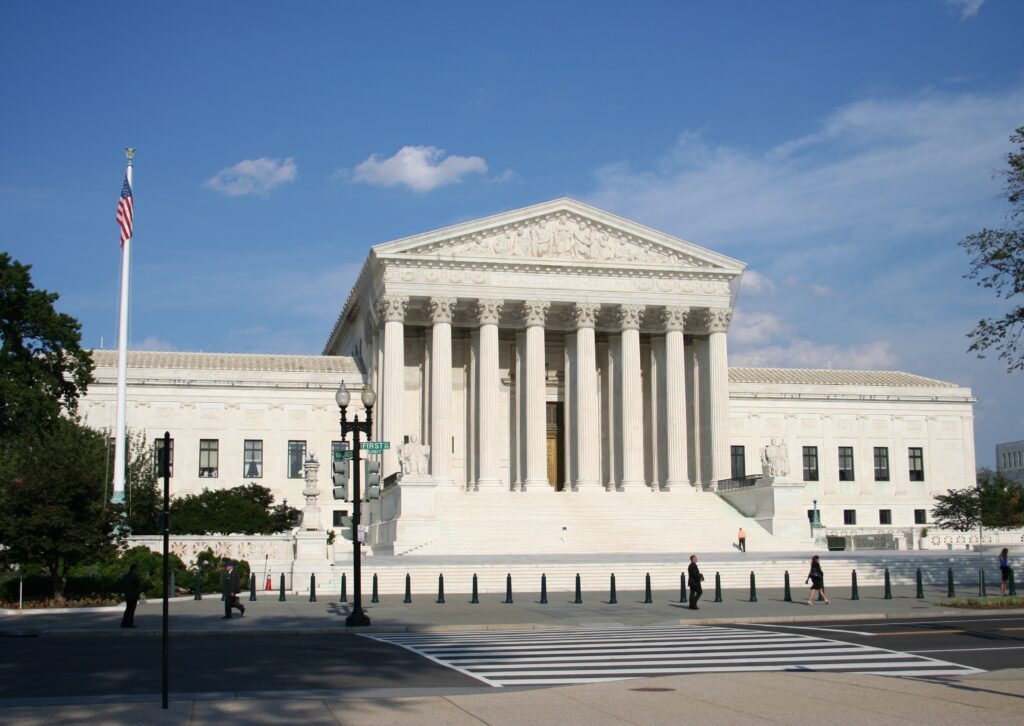In a “Bait-And-Switch,” Louisiana Republicans Ask U.S. Supreme Court To Hear Challenge to Congressional Map
WASHINGTON, D.C. — On Thursday, June 8, Louisiana Attorney General Jeff Landry (R) and Secretary of State Kyle Ardoin (R) asked the U.S. Supreme Court to hear in full their appeal of a case challenging Louisiana’s congressional map. The Republican officials defending Louisiana’s congressional map have changed their stance since less than a year ago when they initially sought emergency relief from the U.S. Supreme Court. So what happened here?

In early 2022, a lawsuit was filed challenging Louisiana’s congressional map.
In March 2022, voters and civil rights groups filed a lawsuit challenging Louisiana’s congressional map arguing that Black voters can only elect their candidate of choice in one of the state’s six congressional districts even though Black residents of Louisiana compose over 33% of the total population and vote cohesively as a bloc. The lawsuit alleges that by failing to include a second minority opportunity district, the map diluted the voting strength of Black voters in violation of Section 2 of the Voting Rights Act (VRA).
A few months later, Louisiana’s congressional map was blocked, but then ultimately reinstated by the U.S. Supreme Court.
In June 2022, a federal district court blocked Louisiana’s map for likely diluting the voting strength of Black Louisianans in violation of Section 2 of the VRA and ordered the state to adopt a new map with a second majority-Black district. Republican officials appealed this decision to the Supreme Court and requested emergency relief, arguing that the Louisiana case, Ardoin v. Robinson, “presents the same question as” the Alabama case, Allen v. Milligan.
The Court granted the Republicans’ requested relief and paused the decision blocking Louisiana’s map and held the case in abeyance pending the outcome of Allen.
Last week, the U.S. Supreme Court issued its landmark ruling in Allen v. Milligan, directly impacting Louisiana’s congressional map.
On June 8, 2023, the Court issued its opinion in Allen — a landmark ruling upholding Section 2 of the VRA. For Louisiana, this means that once the case challenging the state’s congressional map is unpaused, litigation over the map will continue and the congressional map will likely need to be redrawn to comply with Section 2.
After the Court’s ruling in Allen, Louisiana Republicans are trying a “bait-and-switch.”
However, Louisiana Republicans are not happy with the outcome in Allen, so they are changing their position completely. Despite recently arguing that Ardoin presents the same question regarding Section 2 as Allen, Republicans are now arguing that the “facts alone also suitably distinguish the Court’s [Allen] decision” from the Louisiana case.
The groups challenging Louisiana’s congressional map are calling this action out for what it is: intellectually dishonest. In a letter addressing Louisiana’s request for oral argument and briefing, one group challenging the map argues that “[t]he Court should reject this transparent bait-and-switch.”
In a separate letter, another group challenging the map concludes that “now that Milligan has been affirmed without changing the law, there is no basis for hearing this case before the Fifth Circuit has an opportunity to address the merits. Petitioners are free to argue that it should come out differently, but the justification for hearing the case outside of the normal course has evaporated.”
Now, we will wait to see if the Supreme Court will side with Louisiana’s last-ditch effort to save a congressional map that dilutes the voting power of Black voters or if the Court will act as it did in Allen and follow existing law and precedent.
Learn more about the case here.
Read Louisiana’s letter to the U.S. Supreme Court here.
Read the Galmon respondents’ letters to the U.S. Supreme Court here.
Read the Robinson respondents’ letters to the U.S. Supreme Court here.